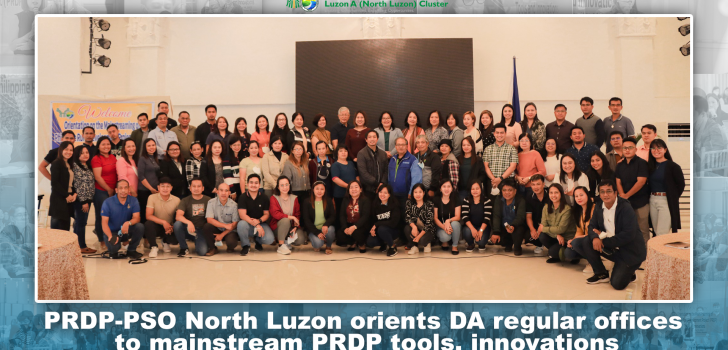
PRDP-PSO North Luzon orients DA regular offices to mainstream PRDP tools, innovations
As part of the continued effort to integrate its tools, processes, and innovations into the regular operations of the Department of Agriculture’s central and regional offices, agencies, and programs, the Philippine Rural Development Project – Project Support Office (PSO) North Luzon, in coordination with the National Project Coordination Office (NPCO), conducted an orientation on mainstreaming of PRDP tools and innovations in Baguio City, from October 12-13, 2022.
According to Deputy Project Director, Elma Mananes, the PRDP has a rich resource of tools and innovations that can be possibly adapted, integrated, and institutionalized across DA’s attached offices and agencies.
“We conducted this activity to enhance awareness on the importance of mainstreaming PRDP, and to assess and identify what tools under PRDP can be applied to the regular operations to further improve the implementation of various programs and projects,” Mananes said.
The invited participants were the regular personnel of various division offices and programs from the four regional field offices (CAR, 1, 2, & 3), including the Field Operations Division (FOD) with banner programs, Planning and Monitoring and Evaluation Division (PMED), Agribusiness and Marketing Assistance Division (AMAD), and Regional Agricultural Engineering Division (RAED).
National Project Coordination Office (NPCO) Senior Institutional Development Specialist for PRDP, Renato Manantan, shared the pool of innovations developed under PRDP that can be possibly adapted by the participants in implementing projects. He also presented the PRDP mainstreaming framework and strategies.
Among the tools, innovations, and processes presented include those under the Local and National Planning (I-PLAN) Component, Infrastructure Development Component (I-BUILD), Enterprise Development Component (I-REAP), Monitoring and Evaluation Unit (M&E), Economics, Social and Environmental Safeguards (SES), Procurement Unit, and Geomapping and Governance Unit (GGU).
Under the I-PLAN, Component Head William Valdez, shared the use of some PRDP science-based tools such as Commodity Prioritization Tool (CPT), Value Chain Analysis (VCA) and commodities with VCA, Provincial/City Commodity Investment Plan (P/CCIP), including the Expanded Vulnerability and Suitability Assessment (e-VSA). For I-BUILD, Component Head Engr. Ernestor Pitok, presented the Operation Manual for Infrastructure Support, including, Project Development Cycle, Infrastructure Quality Monitoring and Durability System (IQMDS), Operation and Maintenance Manual, and Operation and Maintenance Audit System (OMAS). As for the enterprise component, I-REAP Component Head Jamesiah Badua-Lompero showed the process of their component in approving and implementing enterprise subprojects, from pre- to post-implementation processes, highlighting the documentary forms and requirements needed in the implementation.
Under I-SUPPORT Component, Monitoring & Evaluation (M&E) Unit Specialist, Karen Cortado, presented their tools, such as Management Information System (MIS), Data Management and Processing, Rapid Appraisal of Emerging Benefits (RAEB), and Citizen Monitoring Tool (CMT). Economist James Sabio shared the role of the unit in assessing subprojects through validation activities, preparation of the feasibility study, and economic and financial analysis (EFA). Procurement Unit Head Engr. Mary Ann Capillo’s discussion included Procurement Planning, Methods, Community Participation, and Proponent Group – Procurement Selection Method, among others. As for GGU, the unit’s GIS Officer Romille David presented their unit’s innovative tools used in project monitoring and transparency promotion, such as the geotagging and geo-referencing for project phases, materials, and others to make sure that plans are correct and adhered accordingly. Lastly, SES Unit Head Emmanuel Aragones, presented the ways employed to ensure that social and environmental safeguards are prioritized in project implementation.
As part of the activity, a workshop was done per region to see which and what tools presented can and will be integrated into their respective regions. (Ericson M. Guiao, PSO A InfoACE)
